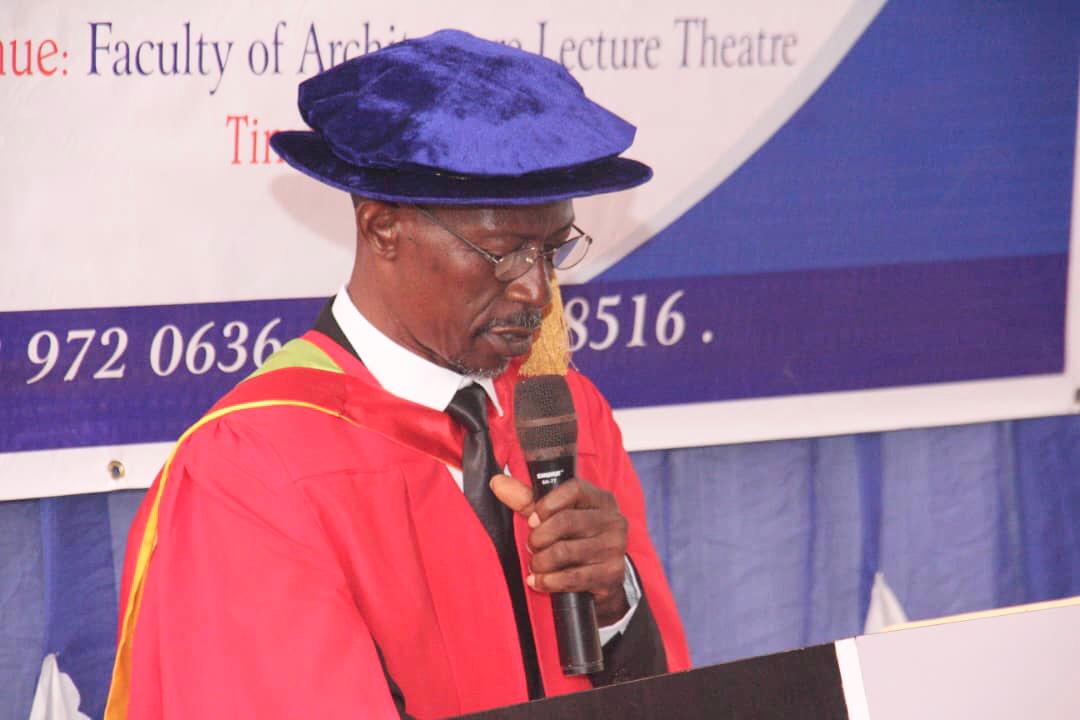
Prof. Odoma Presents Bingham University's 6Th Inaugural Lecture
Published on: Jun 25th, 2024
Professor Samuel Unenwojo Odoma, a professor of criminology in the Department of Sociology delivered Bingham University’s 6th inaugural lecture on the theme: "The Imperative of Securing Nigeria’s Security."
In his welcome address, the Vice-Chancellor, Prof. Haruna Kuje Ayuba commended Prof. Samuel Odoma for taking up the challenge to present the 6th inaugural lecture. Prof Ayuba emphasized the importance of inaugural lectures in the University as it is a part of its culture. Quoting from the Keffi declaration, a document agreed upon by the Committee of Vice-Chancellors in 2012, “it is the inaugural lecture that inaugurates a person’s chair as a Professor and this is usually held within one or two years after the date of appointment, promotion, and announcement. This cherished academic tradition has been neglected or is done on an irregular basis in many universities, to the extent that some professors retire without giving their inaugurals."
He stressed the importance of ensuring that professors in the university do not retire without delivering their inaugural lecture.
Also in his remarks, Prof. Michael S. Akpan, Dean of Social Sciences, expressed gratitude to the university's management and Prof. Odoma for the inaugural lecture. He emphasized the critical relevance of the topic to Nigeria's security situation over the past 25 years. Prof. Akpan highlighted that the concepts of imperative and security are essential for any economy, and their absence has adversely affected Nigeria's well-being, with citizens suffering directly from insecurity. He expressed optimism that the lecture would provide valuable sociological insights and potential solutions to Nigeria's ongoing security challenges.
In his lecture, Professor Odoma traced the roots of Nigeria's security problems back to historical, socio-economic, and political factors. He highlighted how these issues have evolved over time, contributing to the current state of insecurity in the country. He noted, "The historical antecedents of our security challenges are deeply intertwined with the socio-economic disparities and political instability that have plagued our nation." He added that the security operatives who are the arrowheads of our security architecture are attacked and sometimes killed like common criminals, thereby sending dangerous signals to the citizens that they are after all not secured. Professor Odoma argued that by understanding these underlying causes, policymakers and security agencies could develop more effective strategies to combat insecurity.
Prof Odoma also addressed the issue of inter-agency conflicts within Nigeria's security forces, which is a significant barrier to effective national security. He presented findings from his doctoral research on the clashes between the Nigerian Army and Police, highlighting causes such as superiority struggles, economic hardships, and lack of discipline among lower-ranked officers.
His recommendations for resolving these conflicts are constant dialogue and re-socialization of security personnel, especially among non-commissioned officers; ensuring that security agents respect the laws they enforce and submit to routine checks by other agencies to foster mutual respect and cooperation; Improving the welfare of security personnel to reduce the temptation of engaging in unauthorized duties; and maintaining discipline within the agencies to prevent self-commanded, ego-driven conflicts.
Prof. Odoma emphasized the emergence of unknown gunmen and bandits as significant threats to national security. These groups operate covertly, exploiting the disjointed nature of security agencies.
Prof. Odoma concluded by highlighting effective ways to address Nigeria's current insecurity crisis. A comprehensive change in attitude is imperative across all stakeholders involved in security provision: the government, citizens, and security operatives. Each must commit wholeheartedly to achieving robust security measures, as all have played roles—directly or indirectly—in perpetuating the current insecurity.
The highlight of the event was a presentation of a plaque of honour to Prof. Samuel Unewojo Odoh Odoma by the Vice-Chancellor .
The event was attended by serving and retired security personnel and the University community.

